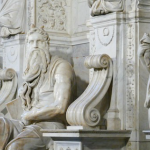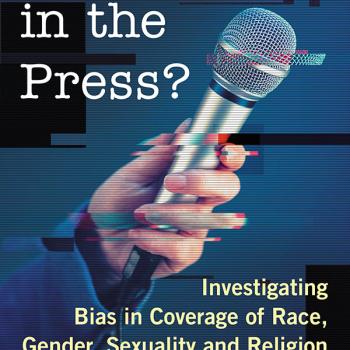There is an antiquated belief that science and religion cannot mix. Some try to hold onto this belief for what I believe are political reasons and this belief is doing a lot of damage. I have even seen some people comment that Christians cannot be scientists which of course sets Christians up for prejudice in academic settings.
I generally take the view of Non-overlapping Magisteria by Stephen Gould. My starting point is that science and religion are asking different questions and thus there is no inherent conflict between the two. But I go further than that assessment. I argue that, in modern society, religion can help us in our scientific endeavors. As such, being a Christian has worked to my advantage in helping me to do my scientific work. I know that for myself being a Christian has made me a better scholar and scientist.
Now let me be clear that I am not making a systematic claim that Christian faith always allows a person to become a better scientist. I can only talk about the situation that I clearly know best, and that is what my religious faith has done for me. I know of no systematic study that shows that having religious faith makes one a better or worse scientist (Yes, I know of the Nature study about leading scientists rejecting God but that is a poor study for illustrating whether faith or nonfaith impacts one’s ability to do science as opposed to whether there is a social environment in academia that encourages nonbelief or discourages religious belief). So today I am just speaking for myself.
When I was an undergraduate, I thought of scientists as individuals who were openly searching for truth. No matter what the truth may be, the scientist knew that it was his or her duty to discover it. When I entered graduate school, I began to understand epistemology, or the science about how we gain knowledge. I also read important works by the likes of Karl Popper, Karl Mannheim and, for me most importantly, Thomas Kuhn. It was the latter’s work that had the most impact on me.
The reason why Kuhn had such a big impact on me was that his ideas about science working in a paradigm made so much sense. For Kuhn, science is not an open search for truth, but it is an institution that has already created a paradigm about what are the right questions and what the answers to those questions should be. Most of the time, science is done to reinforce the answers that have already been accepted by the scientists. So much for my myth that scientists are constantly engaging in an open search for the truth.
To be sure, Kuhn argued that at times the paradigm becomes so untenable that there is a revolution against it. It is only at such times of revolution that there is a search for the best possible explanation of the evidence around us. That is when real science can be done. But the revolution does not last a long time. We settle on another paradigm, and then science continues to perform the task of reinforcing the acceptable answers in the new paradigm.
I had an experience in a class on early American feminism that reinforced what I was learning from Kuhn’s work. In that class I said little because even back then, I knew that men in a graduate level feminist class were to be seen and not heard. But one day I could not help myself. The professor was discussing a point about sexism in the early development of sociology that I did not think was self-evident. Rather than challenge her on that point (a man directly challenging a female professor in a graduate class on feminism would have been unthinkable in that social atmosphere), I simply asked whether she goes to the data and looks for the best possible answer or whether she had the answer in mind and uses the data to support that answer. To my amazement she admitted that the latter was more likely the case. It was literally what I had learned from Kuhn put right into action before my very eyes.
As I moved on in my career I did so with a new mistrust of the works of scientists knowing that it was plausible that their findings were not merely shaped by the available data but rather by the need to enforce a given paradigm. In my dissertation I learned about how the background of scholars, such as their race, religion, region where they grew up and political orientation impacted their work. I know that being a black Christian who grew up in the southwest and was a political moderate gave me a different perspective than most of my peers, and could lead me to different conclusions than the ones they have drawn.
Indeed, that is what began to happen over time. It was especially the case that assumptions I drew about reality due to my Christian faith provided me with a distinct perspective on social reality. Let me be clear that being surrounded by those with religious beliefs that differed from my own, and having an understanding of society that differed in accordance to their contrasting metaphysical assumptions was quite challenging. In fact, I changed some of my conclusions about social reality due to the challenges I faced from those who had contrasting ideas. Ultimately my faith benefited from these challenges. When I was faced with doubts to my faith, I could no longer rely on blind belief while living among those who intellectually challenged me. I emerged from graduate school with a stronger belief in my Christian walk but a Christian belief system that had been tempered by being challenged by thoughtful non-Christians.
In other words, although the basic tenants of my faith did not change because of my interaction with scientists and would-be scientists in graduate school, some of my periphery beliefs were altered. That is to be expected since my Christian faith deals with different questions that what we deal with in the sciences, so how I interpreted social reality did change while my basic Christian beliefs stayed intact. The way I interpreted that social reality was not simply through the lens of my Christian faith, but also in conjunction with what I learned as a graduate student in sociology. I left graduate school a better thinker than I was going into it, and one of the factors that helped me to achieve that was being the oddball Christian in the room.
In my early years, I conducted most of my research in the areas of race and ethnicity. My work operated within the generally accepted humanist paradigms in sociology. Nevertheless, some aspects of my faith gave me insights that I would not have otherwise obtained. For example, my belief about human depravity provided me with a different perspective on the responsibilities of all racialized parties in our ongoing racial conflict. But for the most part my writings did not challenge the overarching paradigm in the field. I experienced a respectable amount of success in publishing my work.
About ten years ago, I switched my focus to anti-Christian bigotry in the Unites States. This work has certainly not fit within the humanist paradigm in the social sciences. Consequently, I have had a harder time getting my work published. It is more difficult for me to get into the higher ranked journals and book publishers, so I have had to adjust my expectations in the face of this new reality.
But while it is disappointing that these new challenges have arisen, they have also forced me to be more careful in my work. By nature I am a fairly sloppy person who sometimes likes to take shortcuts. But to do quality academic work, one has to avoid being sloppy and avoid taking shortcuts. This pressure is even more intense when one works outside of the larger paradigm. There is little forgiveness for even minor errors when working outside of the acceptable paradigm as reviewers are eager to find a reason to reject your work. Thus being a Christian and producing work that is outside of the overall scope of the field has forced me to be more circumspect and careful in the type of work I do. In this way, having a Christian identity in a social environment where Christianity is not simply ignored but also vilified has force me to be more careful with my research. This care is part of what makes me a better researcher and thus a better scientist.
The theory of confirmation bias indicates that we are more willing to overlook the problems of ideas that we agree with than those we do not agree with. Scholars are not free from the social forces that produce confirmation bias. As such when I attempt to publish work that challenges the larger paradigms of the field, I know that I will get reviewers who are looking for reasons to reject the work. They will scrutinize my work harder than studies that have conclusions that they favor. This forces me to be extra careful in my work and indeed forces me to do better work. I believe that my work on anti-Christian bigotry is better than my work on race even though my race work is placed in better journals and with more highly ranked academic book publishers. But my work on anti-Christian bigotry is better because I have been forced to work harder to make it sound and to deal with any shortcomings of my research. Thus my Christian faith, by making me contrary to many of the expectations of members in my field, has forced me to become a better scholar.
Now at this point some may say that there is nothing innately within your Christian beliefs that makes you a better scholar but merely the fact that you operate in a social atmosphere of non-Christians that have challenged you and forced you to improve your work. I would agree with that sentiment up to a point. There is an argument that theism offers a predictable world and thus the use of science can make sense of our world. This indicates that science has to operate within the parameters of theistic assumptions. I get that argument but I am not going to make it at this time. What I am going to argue is that it is true that a big part of why my Christian faith makes me a better scientist is because of the revolutionary assumptions that faith brings to science. There may be other mechanisms that also have a similar effect, and Christianity is not unique for fulfilling this task.
But those that make this argument are missing a key component. Even if Christianity is not unique to accomplishing this purpose, my exercise has revealed the importance of viewpoint diversity if we want to maximize the ability of scientists to make important discoveries. Failure to recognize the forces within academic that inhibits the expression of viewpoint diversity does a disservice to our sciences.
I fear that too many scholars have not been blessed by being challenged in the way I was in graduate school and even today with my contrarian perspectives. Not being challenged can create a soft and lazy science that is more politically, than intellectually, motivated. It is beyond the scope of this blog to discuss specific examples, but merely think about how science works to reinforce certain social and political ideas, and then you will know how events such as Sokal Squared can take place.
I know that some individuals felt that my work on academic bias is done from a selfish basis. After all, my finding that nonleftist Christians face bias would help me as a nonlefitst Christian, right? Well they are partially correct. My work does have a selfish motivation. I want a science I can trust and is better than our current institutions. Dealing with biases and helping academia to welcome real debate will enable lead me to meeting the goal of that “selfish” motivation.












